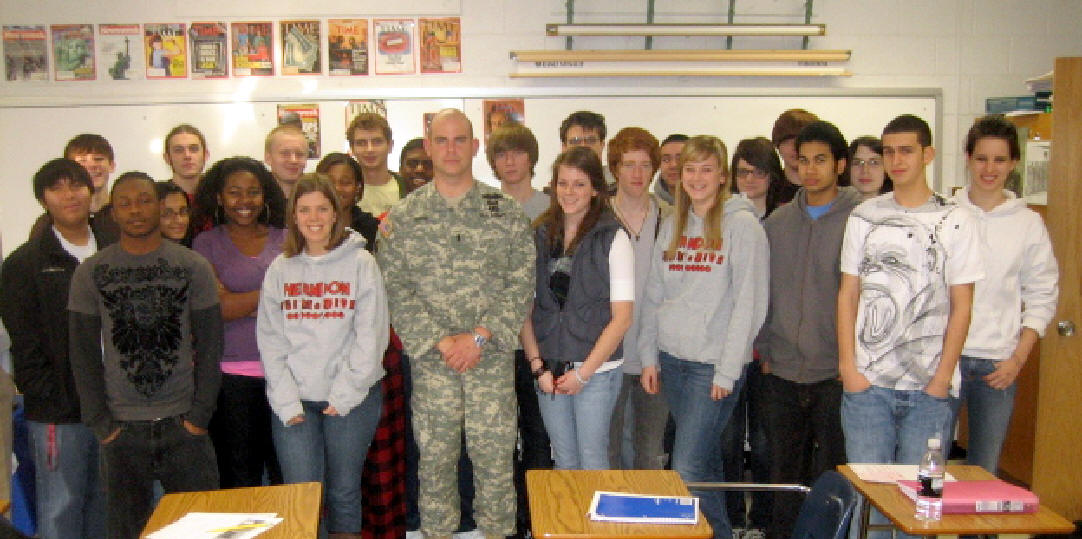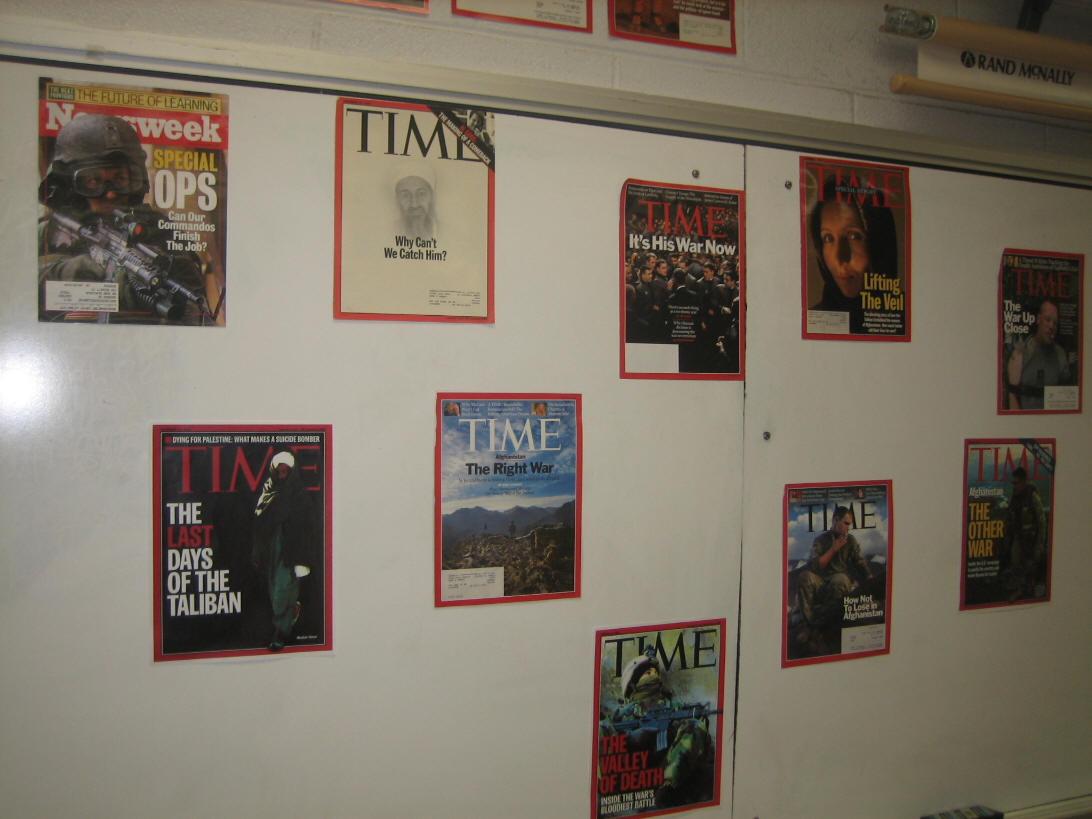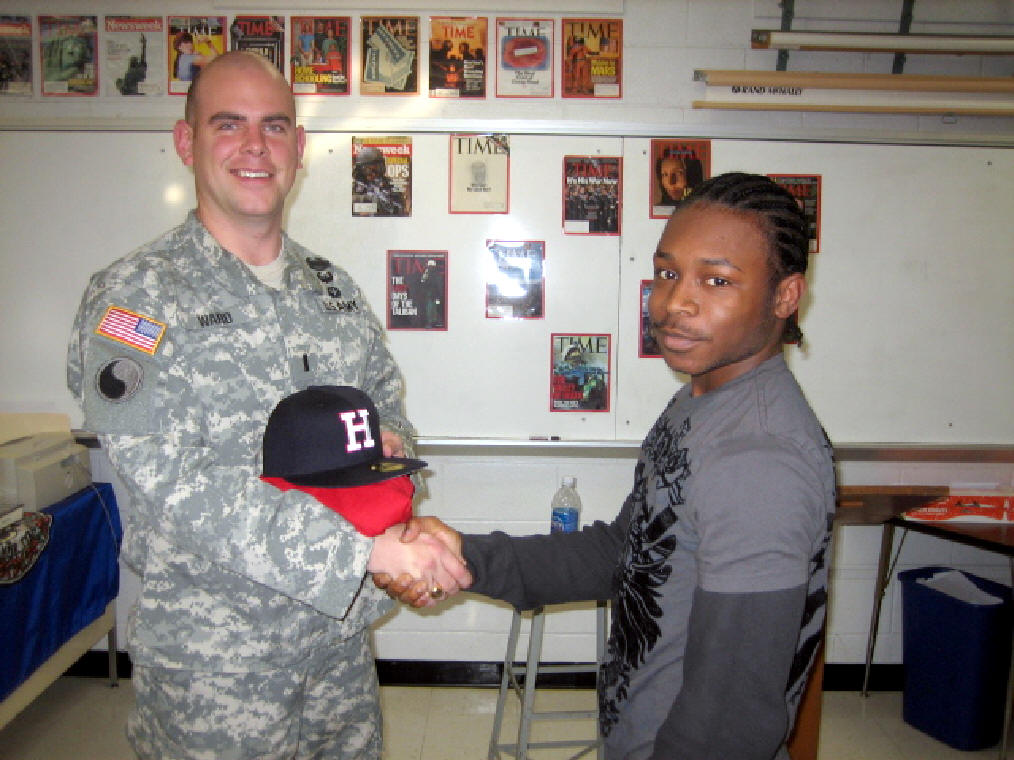
First Lieutenant Matt Ward (HHS Class of 2003) Speaks to US/Va Government Students About Serving in Afghanistan

"I Appreciate What You're Doing For Us." Mike thanks Lieutenant Ward and presents him with HHS gear for speaking to his US/Va Government class. Lieutenant Ward discussed previous and current war strategy in Afghanistan, cultural differences between Afghans and Americans, his daily life while in Afghanistan and many other topics. This discussion took place on December 16th, 2009. Lieutenant Ward will return to Afghanistan in February, 2010.
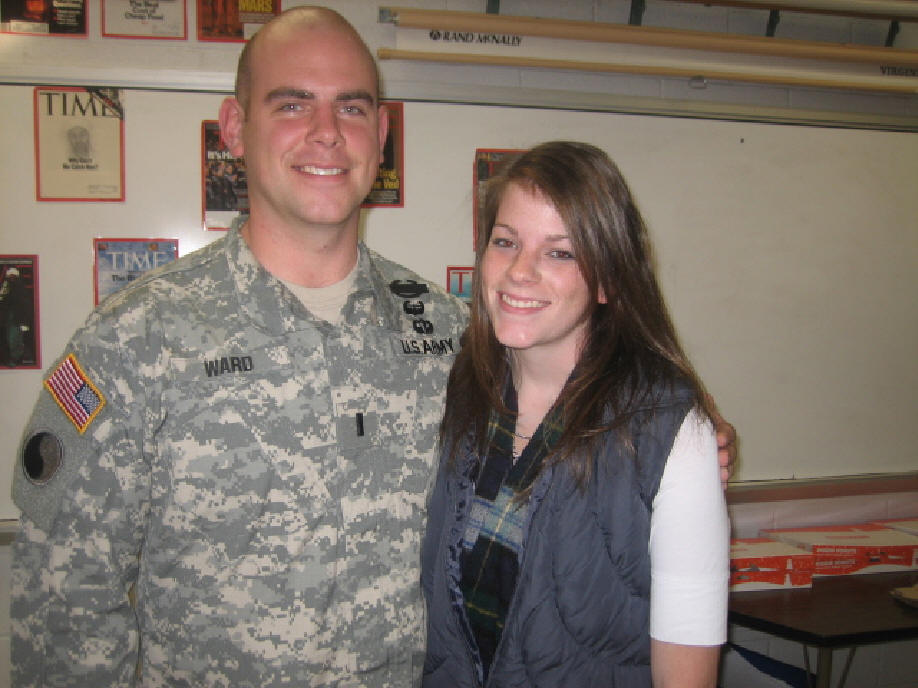
Lisa and her big brother.
Lieutenant Ward's orders from General McChrystal:
We must fight the insurgents, and will use the tools at our disposal to both defeat the enemy and protect the forces. But we will not win based on the number of Taliban we kill, but instead on our ability to separate insurgents from the center of gravity - the people. That means we must respect and protect the population from coercion and violence- and operate in a manner which will win their support.
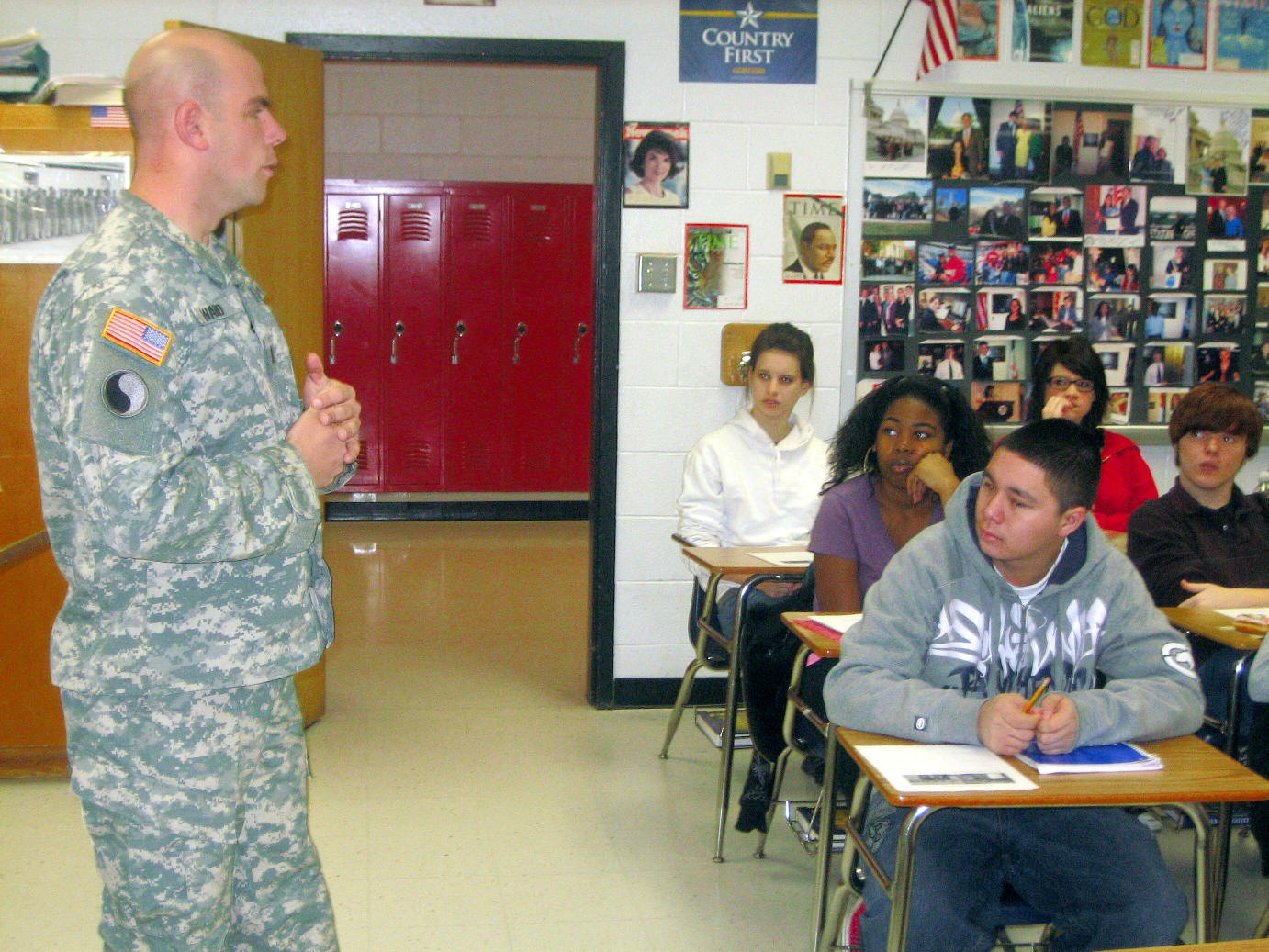
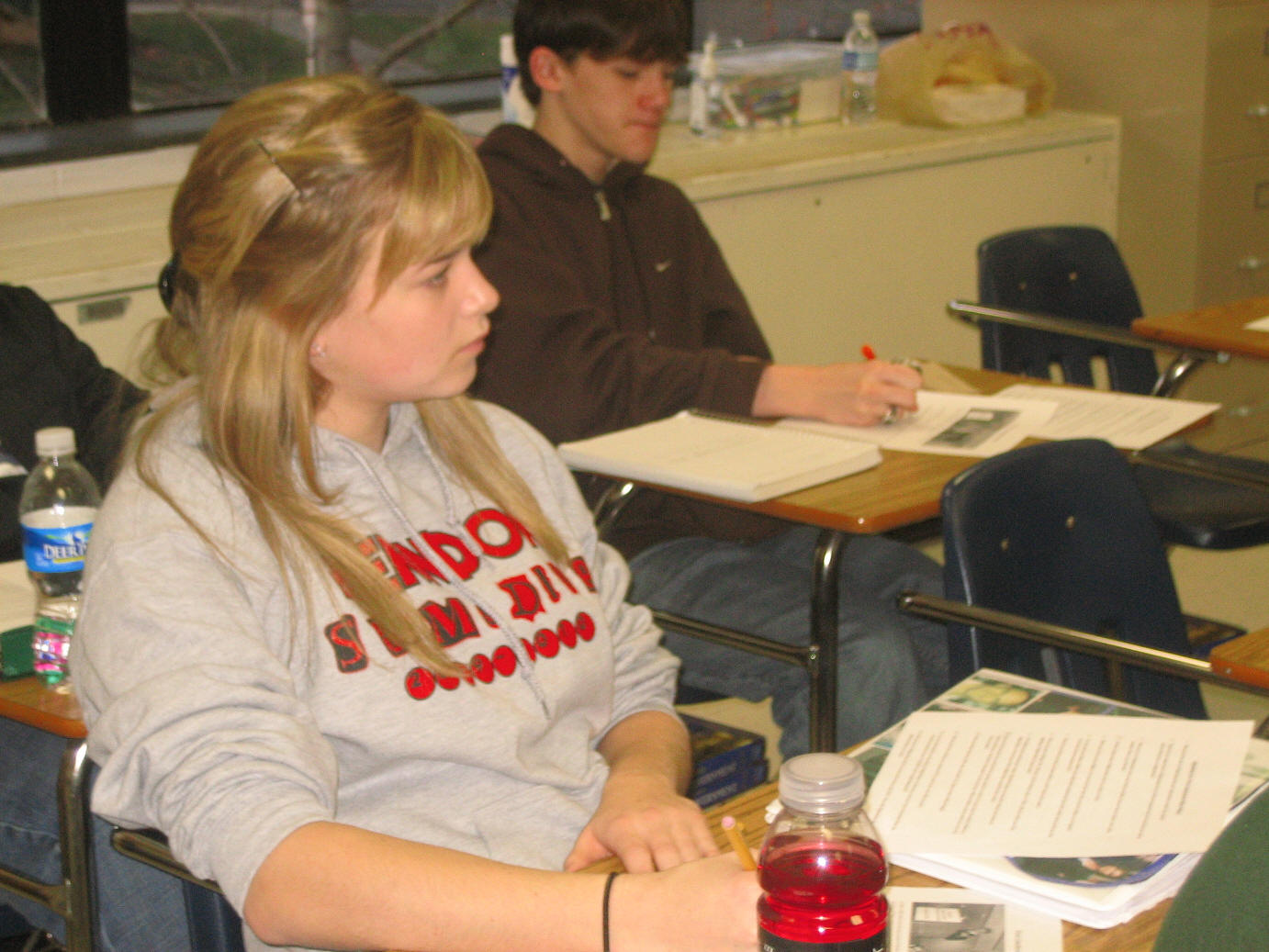
Anna- Is there a typical day in Afghanistan and if so what is it like? ANSWER- No! One of the joys of being in the Army is that every day is different. Every Province, Village, and Tribe has different people, issues, and customs. Things that are common are national interests, the enemy, and the weather.
Anna- General McChrystal was criticized for giving a speech in which he said what President Obama’s policy should be. Are there rules given to you and your fellow soldiers about what you can say to the media? ANSWER- Yes. Service members of the military serve under a different rule of law than criminal U.S. or state code. We are governed under the Uniformed Code of Military Justice (UCMJ). Some of its punitive articles are very different then civilian law. Disrespect, disobedience, and malingering are some of the many things that are AGAINST THE LAW in the military. As a service member, I may not get in front of a camera and dress down my boss (to include the commander-in-chief). I do not believe that GEN McChrystal has violated the UCMJ, nor has he disrespected the President in his London IISS speech. I believe that the General has simply repeated what he has requested from the President. GEN McChrystal was also following his guidance from the President as best we can understand. The President asked the General what he needed, the General made is answer clear.
QUESTION-Based on your experiences in Afghanistan do you think the government of Hamid Karzai will be able to effectively run Afghanistan? ANSWER- I have been asked this question several times and have always said that “I cannot answer much better then you.” When I was in Afghanistan I was an enlisted soldier at the rank of Specialist, and didn’t see much beyond my duties. To include what I have learned since that time, I will say that Afghanistan is a unique place requiring a special set of people and system to be effective. What is not unique about Afghanistan is that it will take courageous people who are willing to take a risk in building a legitimate government. Without these people Karzai’s government will not work.
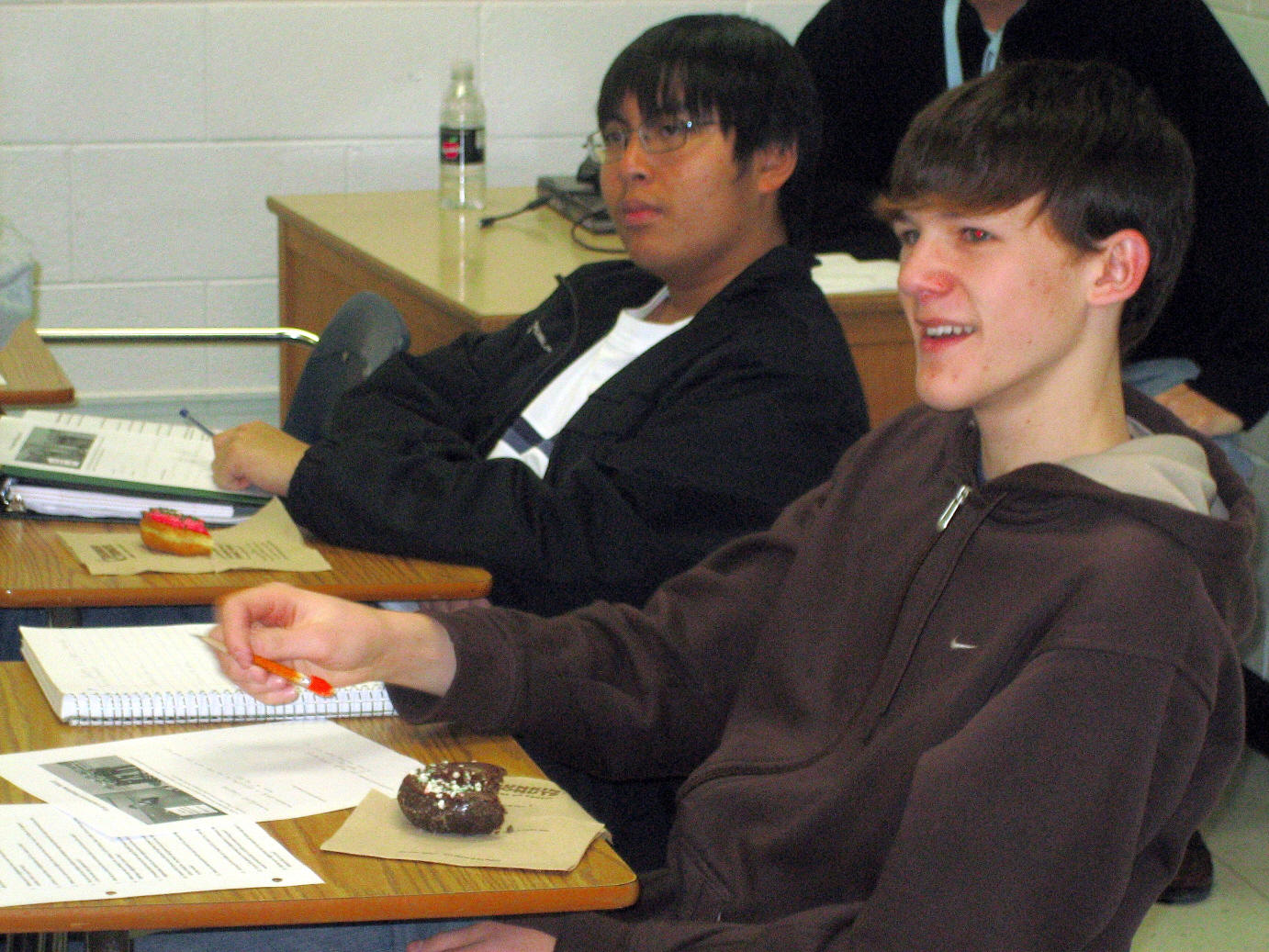
Alex- When you first were in Afghanistan did your expectations match the reality? ANSWER- No! No matter how much training you can receive there is a culture shock that cannot be prepared for. That goes double for Afghanistan. The terrain is unforgiving, the weather is painful, and the people are complex.
Kevin- While in Afghanistan do you ever wish you were back home in the U.S.? ANWER- Yes. All the time. The small things are what matters.
Question- When you’re in Afghanistan how is your food provided, do you stay at a base, ever sleep outside, what is your life like? ANSWER- The infantry and support personnel are based in Forward Operating Bases (FOBs) or remote Combat Out-Posts (COPs) with food, water, and shelter. Amenities vary but our needs are well provided. Patrols outside of FOBs/COPs last a few days to three weeks. Food, water, ammunition, and equipment are packed on our person (minimum of 50 lbs, as heavy as 90 lbs). If it is a mounted patrol (with vehicles) additional supplies are packed in the trucks. While on patrol we find a couple of hours a day to sleep, almost always outside or inside our trucks. Refer to my pictures. Time spend in the FOBs/COPs is solely spend on preparing for the next patrol.
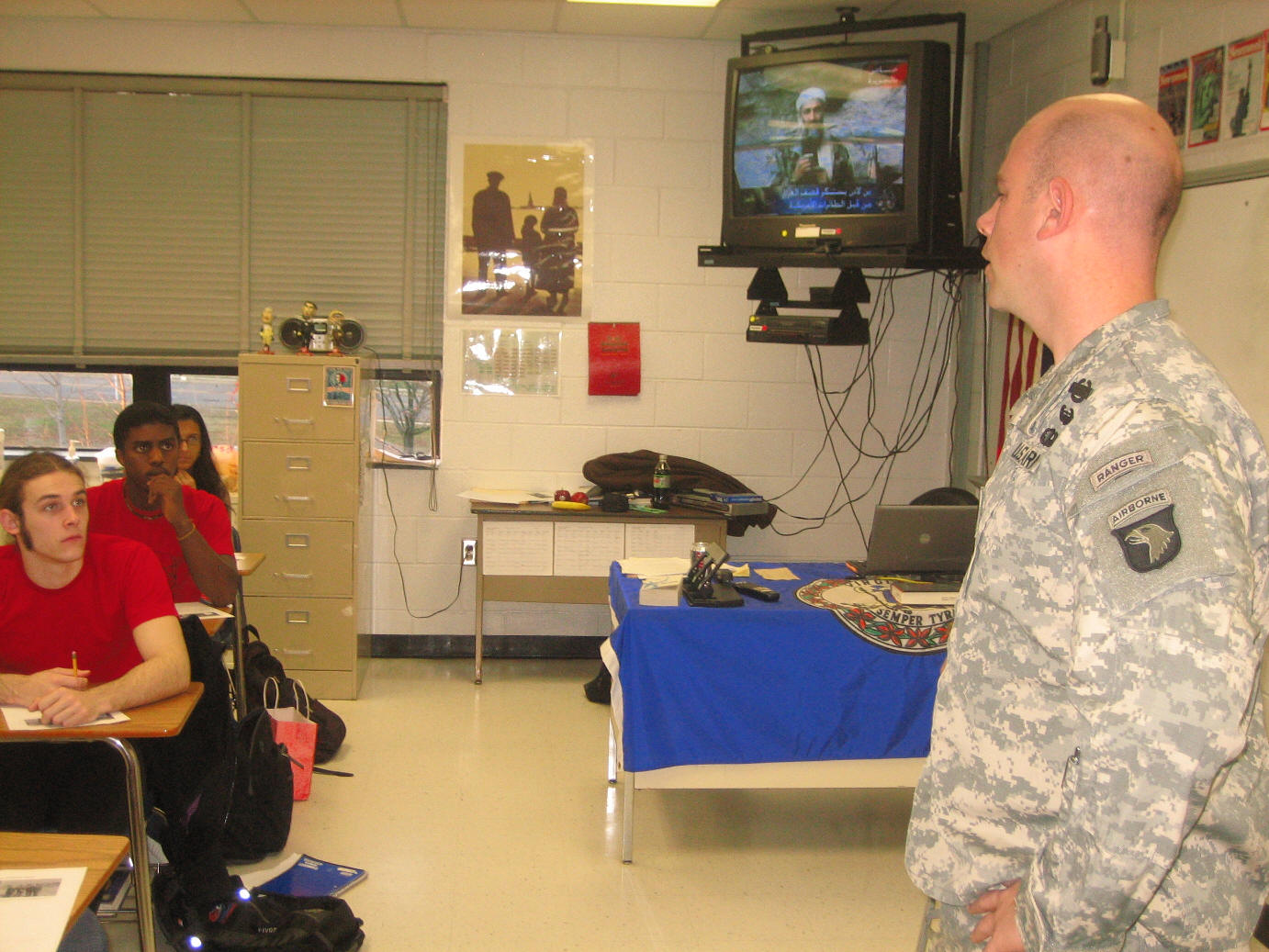
Troy (center)- Why have we not captured Osama bin Laden? ANSWER- My guess is that he moved to Pakistan during the initial invasion. Al-Qaeda works in an underground, secret network in the most difficult terrain on earth. Bin Laden is there most protected person (not necessarily their most important) in many organizations. Capturing him is more difficult than even I can imagine.
Peter (left) - Did you join the military as a result of 9/11 and if not why did you join? ANSWER- As I stated before I have known I was going to join the military since I started high school. When 9/11 happened my junior year I definitely questioned if it was something I still wanted to do. My motivation to join the military was to have a different kind of life experience. To do things you can’t do anywhere else and get paid for it. After reconsidering my plans watching 9/11 I was still settled on joining, because I would have regretted my whole life to have never done my part for my country. 9/11 strengthened my reasons for joining.
Question- As you look ahead to returning to Afghanistan in February, are you more motivated than you would normally be due to 30,000 more troops being sent? ANSWER- No, I’m more anxious. I have dozens of questions about what this surge will look like on the ground. What kind of troops will they be? Are these troops combat/infantry or service support? Will my area of responsibility change? Are there extra resources they are bringing with them? Its too early to tell.
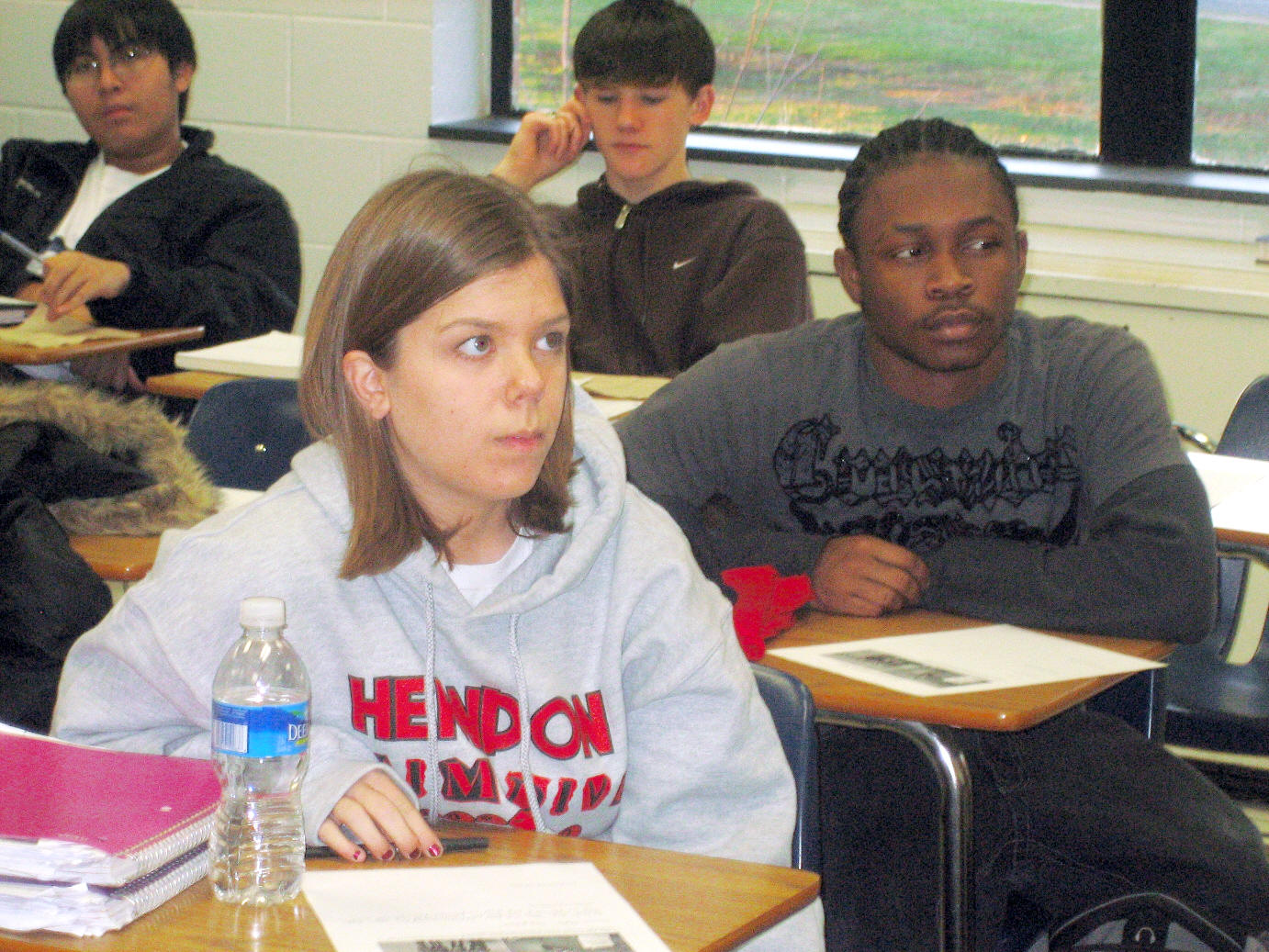
Taylor- Do you and your fellow soldiers ever talk about capturing Osama bin Laden and would you like to be the one that captures him? ANSWER- Yes! I’m glad that capturing him has become a priority for NATO/ISAF again. Anyone would love to capture him. Not because of the fame or glamour, it’s because we know that it is important. We use to think that because we have marginalized him so much it did not matter if he was captured. We now know that in a counterinsurgency fight our ammunition is not bullets, its information. Capturing bin Laden would be a serious defeat to the insurgency, information that they are losing.
Mike- Have you ever come in contact with or been attacked by a strange animal? ANSWER- Yes, an aardvark attacked me and tried to steal my lunch. I killed it. I've had to deal with camel spiders too.
Question- Will we win in Afghanistan and if so what will victory look like? How will Afghanistan be different than it is now? ANSWER- Yes! This fight is winnable. We can win this war so long as America still wants to fight it. A vast majority of Afghans want this to work. People are the objective in this fight, not terrain. Victory will look nothing like what we think it will. As we achieve more in Afghanistan the less people will hear about it. Much like the way Iraq’s successes have not been heard. I predict victory will take a very long time as insurgences in the past have shown. To say what Afghanistan will look like is so hard to say, because they have been in war for over 30 years.
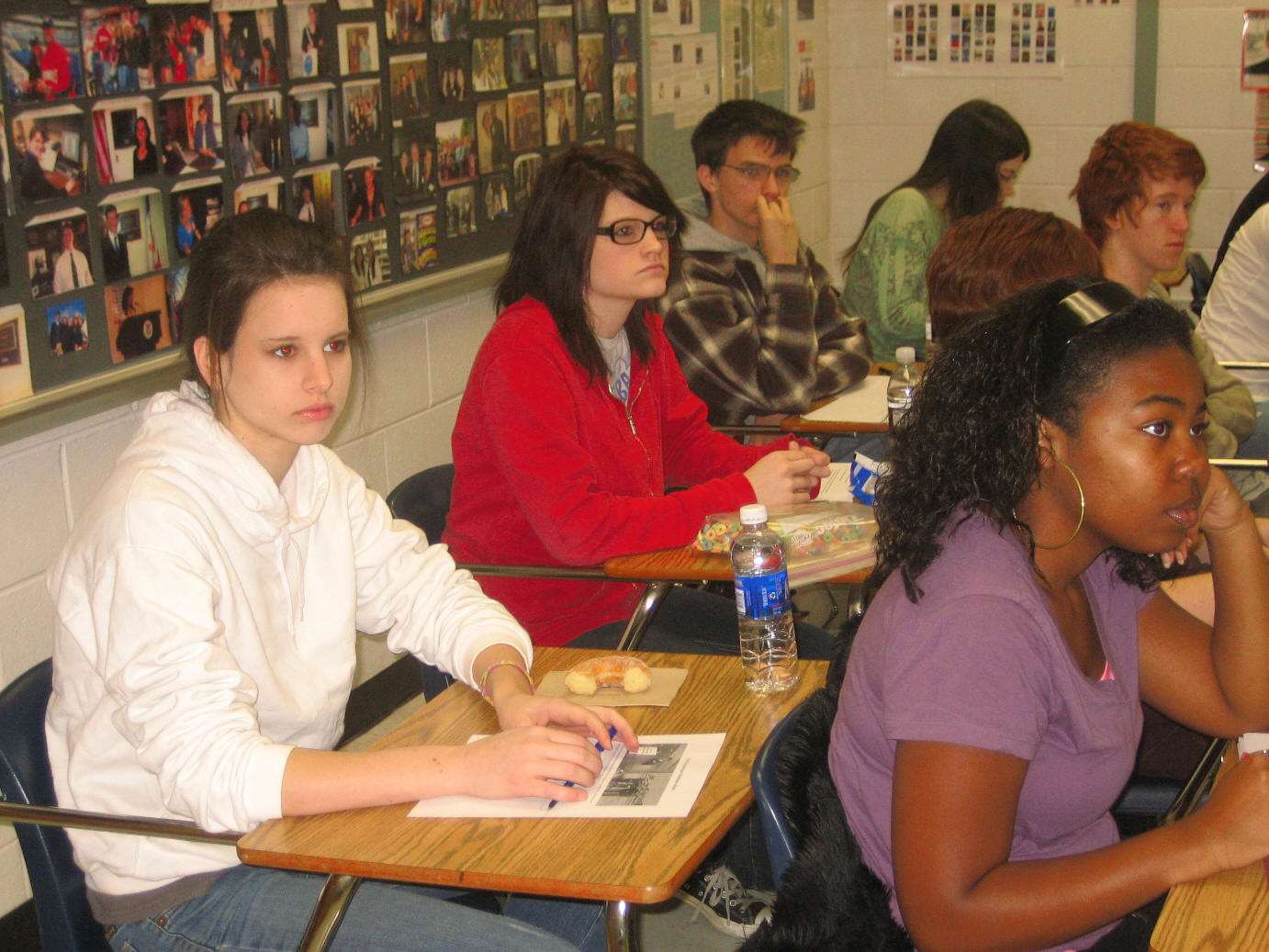
Kelly (left)- Are there any differences being in the military with President Obama as Commander in Chief compared to President Bush? ANSWER- No. Our army has changed and evolved even since I have joined in 2004. These changes are the adaptation to the contemporary operating environment. Our army will continue to do so as war changes, not our Presidents.
Rebecca (2nd left)- Last week President Obama discussed the concept of a "Just War." Do you think any war is moral or ethical? ANSWER- War is not moral, but it is justifiable. This topic is one of political philosophy. I will only say that I fight in a war that is just, because my homeland was immorally attacked.
Jamie (3rd left)- Our class watched the film “Taking Chance”; about the process of escorting the remains of a soldier, PFC Chance Phelps, back to his hometown for burial. Are you familiar with that process and would you like to do escort duty? ANSWER- I love that film. I am familiar with the process. The film did a great job showing how we handle remains and our escort traditions. As Lieutenants and other officers we normally work the other side of that process which is Casualty Assistance Duty. We are assigned to be Casualty Assistance Officers and our duty is to assist the Family of the casualty with all matters concerning the loss of their family service member. This includes anything from what to do with their property, how to collect life insurance payments, or just being someone to listen. It is an emotional, tireless, burdening job which will last as long as the family wishes. This job is also done on top of our normal duties. Anyone who has served on this duty will tell you that as difficult as it is to do, we look forward to it because we take care of our own.
Alyssa (right)- Do Afghan women ever talk to you about what would happen if the Taliban were back in control? ANSWER- Afghan women do not talk to us. They are not even allowed to be seen by us in the Pashtu culture. When we show up in a village or in a town they quickly gather whatever they need and run inside. We discovered later during our time there that many lies are told to them that prevent them from wanting to be seen by Americans. My favorite one was “Americans wear sunglasses that have x-ray vision so they can see women naked.” The burkas are starting to come off, but Afghanistan has a long way to go in basic human rights for women. If the Taliban regain control of the country the little progress in women’s rights they have made would vanish.
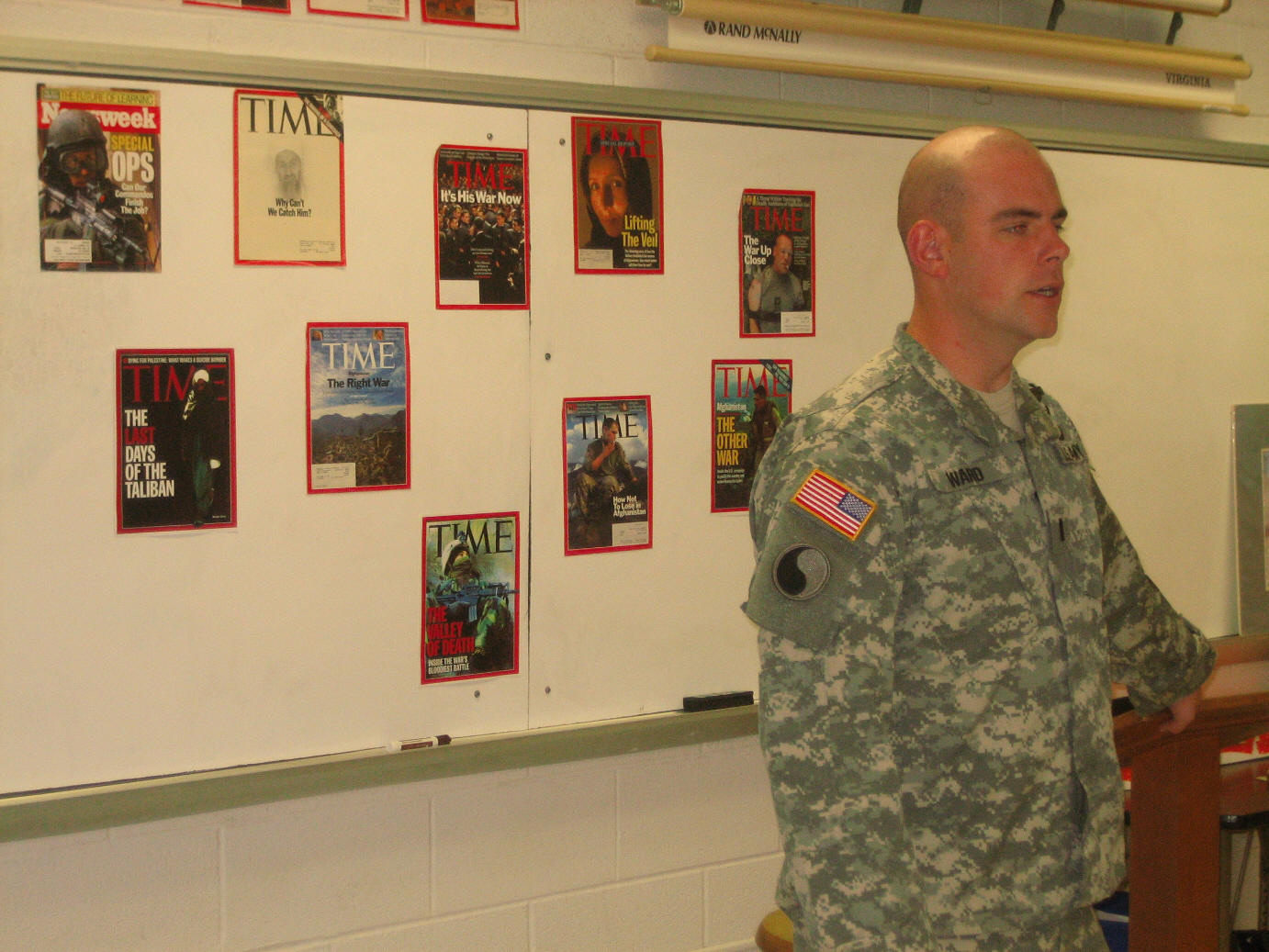
Lieutenant Ward in 2001: http://graney.topcities.com/bulge1.htm and http://graney.topcities.com/pentagon1.htm
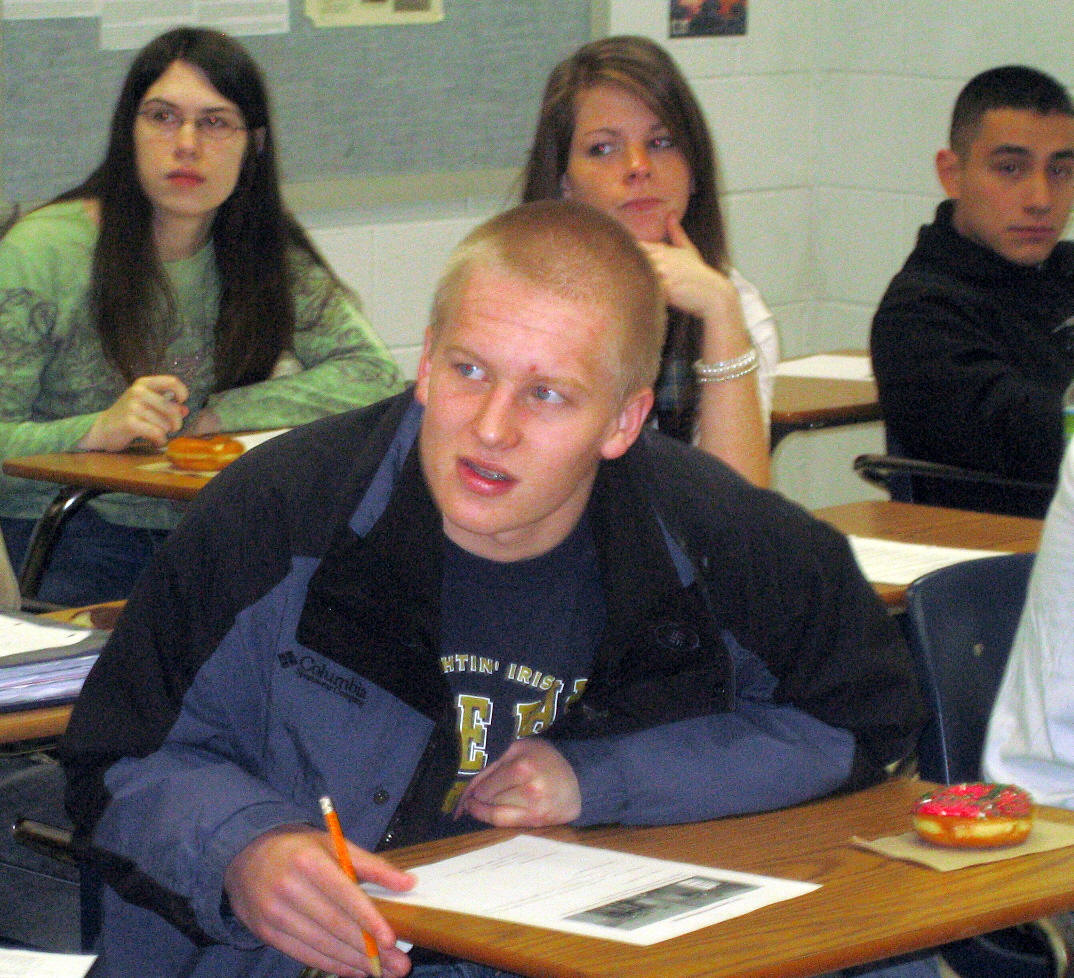
Chris- When you were sitting in Mr. Graney's class in 2001did you think you'd be fighting in Afghanistan 9 years later? ANSWER- Not while I was in his class. I knew I wanted to join the military when I started high school. The year after I was in his class was 9/11. It was then I starting thinking about fighting in Afghanistan.
Lisa (center)- Lisa- When you come across Afghans do you fear they are Taliban or Al Qaeda? ANSWER- “Be polite, be professional, but have a plan to kill everyone you meet,” I’ve heard this rule countless times in training, classes, and in Afghanistan, and there is no truer rule. The difficultly of fighting an insurgency is that the enemy is unidentifiable and sometimes hard to define. Yes, everyone fears that the people we meet may also be the enemy. Sometimes they are the enemy.
Question- Generally speaking, what are the Afghan people like? ANSWER- Hospitality is the most amazing part of the region and culture. Talking business is a slow and deliberate process which can be frustrating. Formalities and customs are a huge sign of respect. Afghans specifically want people to be true to their word, so we must be careful what we say. Saying I will help a village with its farm and not doing so is a violation of respect.
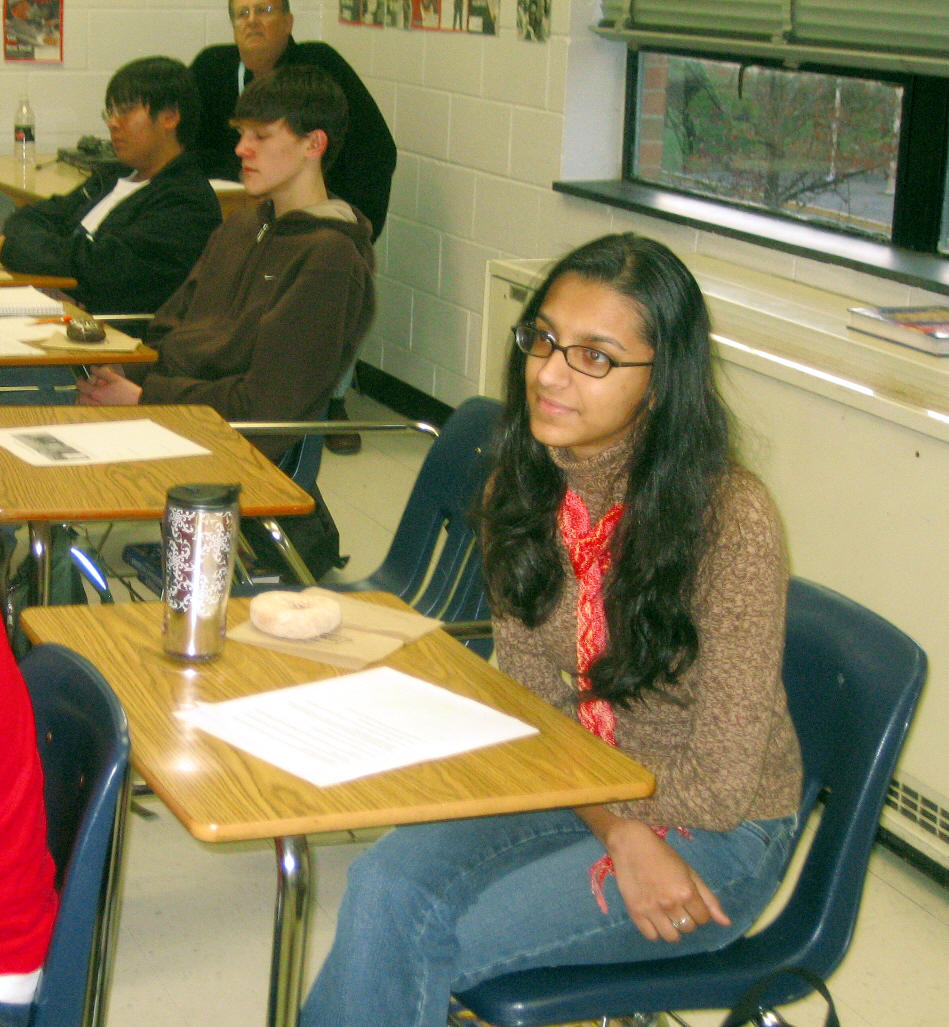
Mansuma- Have you had any health problems? What happens when you get sick in Afghanistan? ANSWER- I have not been sick but it is so cold there. People confuse Afghanistan with Iraq and think it's always warm. Last time I was in Afghanistan it was 25 degrees below zero.
Question- What is one thing you would like us to know about the military’s experience in Afghanistan? ANSWER- We want to do this right. Our greatest motivation to do a good job is that fact that we don’t want to go back again. Do not believe those who say we hate the Afghans and act like cowboys. We are damn good professionals.
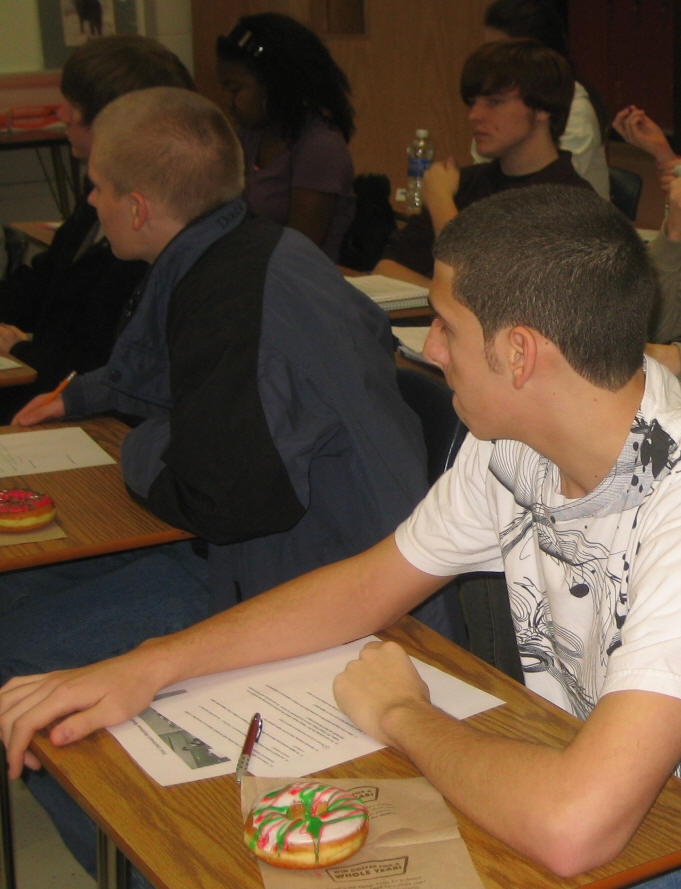
Matt- Did you or do you want to serve in Iraq? ANSWER- Admittedly, yes. When I was commissioned I was hoping for orders to Iraq not Afghanistan. That is simply because I’ve already been to Afghanistan. I wanted to experience something new.
Raza- What is enjoyable about your duty in Afghanistan? ANSWER- My fellow soldiers. No greater team could ever be formed that one that is isolated 8,000 miles away from home and fighting a war. As much as they may have annoyed me at times, they are the best part about being deployed.
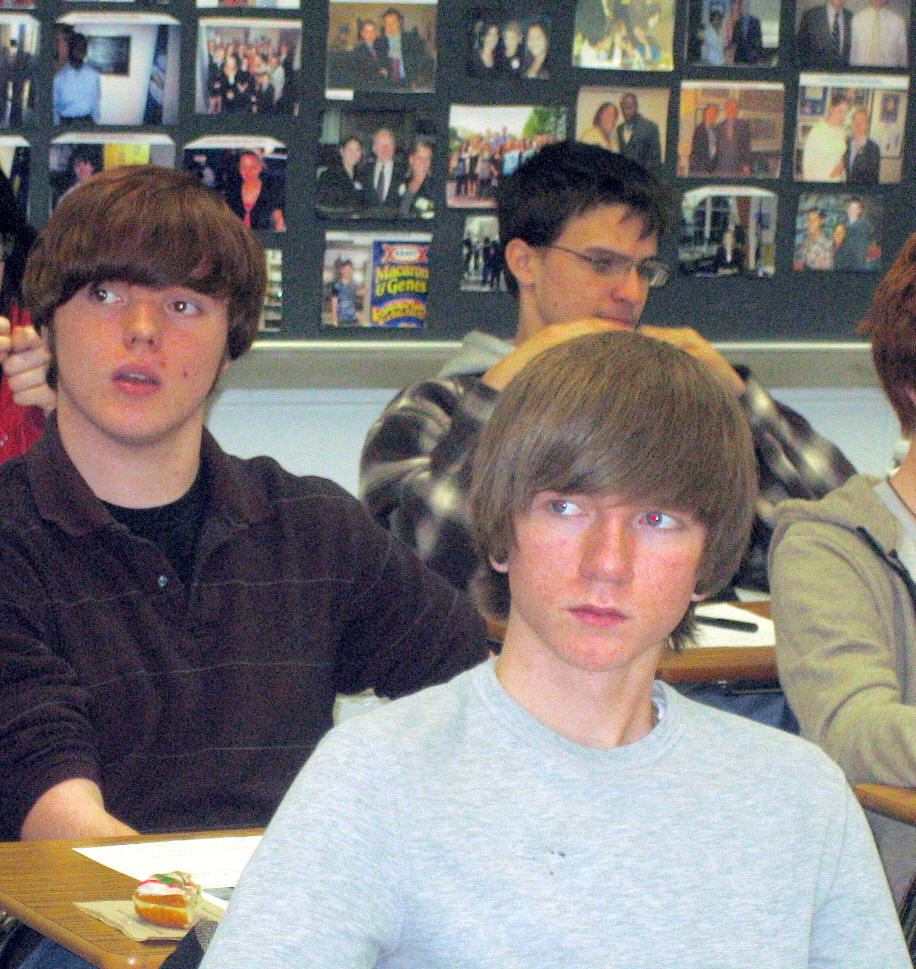
Dan (left)- If President Bush had not sent 200,000 troops to Iraq and instead send them to Afghanistan, what do you think Afghanistan would be like today? ANSWER- Really difficult to say. GEN Patraeus and others have development a sound and comprehensive counterinsurgency strategy based on asymmetric warfare (instead of symmetrical conventional warfare). We have learned that people are the objective, not terrain. Information is the ammunition, not bullets. In a counterinsurgency fight many things seem counterintuitive. For example, the more time you build your defense the more likely you are to be attacked. The counterinsurgency strategy works wherever we exercises it, but the operations and tactics depend on the place. If the 2007 Iraq surge had gone to Afghanistan instead I think it would have not been effective. Unless, we would have used the operations and tactics we know now.
Allen-Have you had reporters with your unit and if so how do they affect things? ANSWER- Yes, nothing high profile. We had a Virginia newspaper reporter embedded with us for about three months. He did a great job in explaining to Virginians how we were accomplishing our mission. We tried to get him involved as much as possible, and of course we protected him as much as possible. The real nerve racking experience is coming across foreign media services while in the field. The media plays an extremely important part in the counterinsurgency fight. We use them to get our message across as best as possible. I, as well as my men have trained and rehearsed frequently to get the coalition message on camera as best as possible. It’s something we plan for.
Question- Would you recommend one of us joining the military and if so why? ANSWER- If you are looking for a job in which you can do extraordinary things that you cannot find anywhere else, then the military is for you. I have fired dozens of weapons, jump out of airplanes, rappelled out of helicopters, climbs mountains, and I’m responsible for 35 lives. Where else can you find all that and get paid to do. Do not be naïve to think that you will not deploy in support of our contingency operations. In today’s world joining our armed service is a greater calling, you WILL be defending this country. Which makes joining our military that much more important and special.
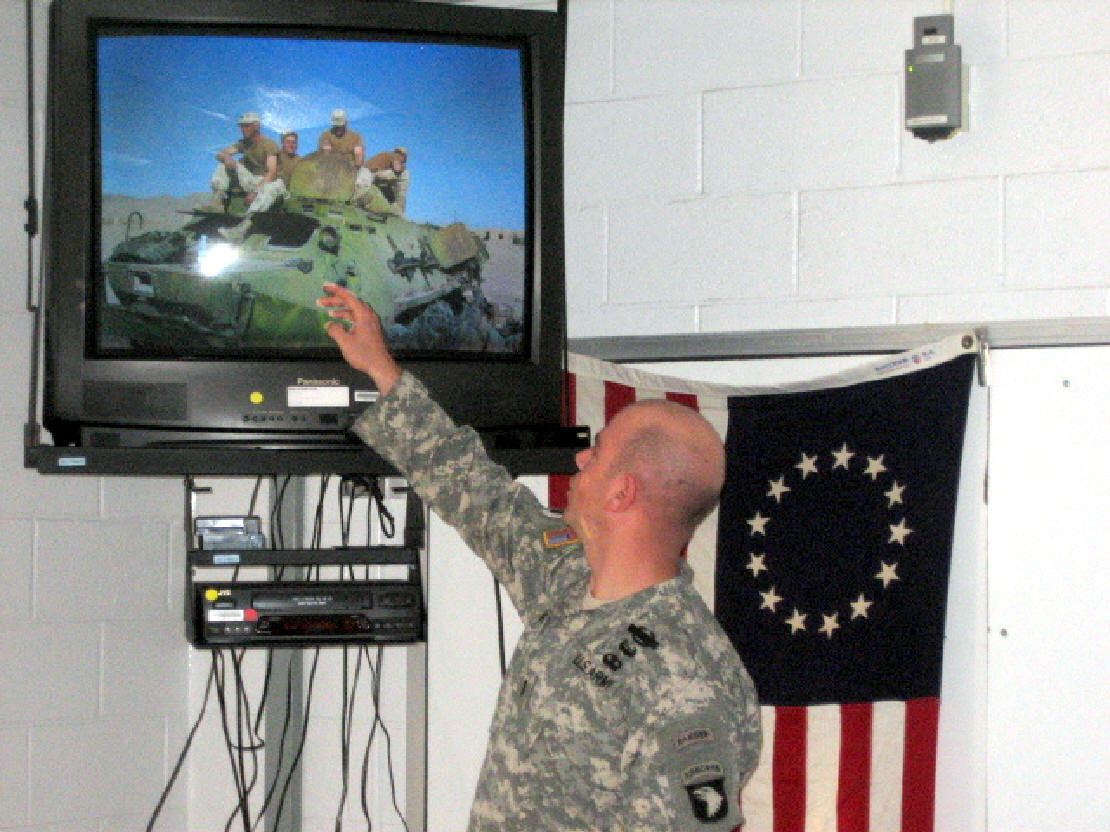
Lieutenant Ward presented a PowerPoint on his work and life in Afghanistan
